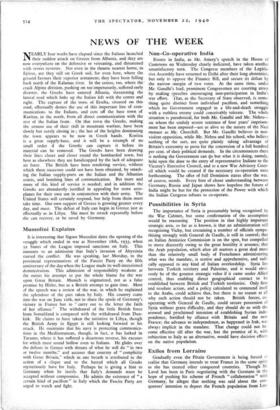Non-Co-operative India
Events in India, as Mr. Amery's speech in the House of Commons on Wednesday clearly indicated, have taken another unsatisfactory turn. The Congress members of the Legisla- tive Assembly have returned to Delhi after their long abstention, but only to oppose the Finance Bill, and secure its defeat by the narrow margin of two votes. At the same time, under Mr. Gandhi's lead, prominent Congressmen are courting arrest by making speeches encouraging non-participation in India's war effort. That, as the Secretary of State observed, is some- thing quite distinct from individual pacifism, and something which no Government engaged in a life-and-death struggle with a ruthless enemy could conceivably tolerate. The whole situation is paradoxical, for both Mr. Gandhi and Mr. Nehru— on whom the unduly severe sentence of four years' imprison- ment has been imposed—are as alive to the nature of the Nazi menace as Mr. Churchill. But Mr. Gandhi believes in non- violent opposition, while Mr. Nehru and his school, who believe nothing of the sort, are quite plainly taking advantage of Britain's extremity to press for the concession of a full hundred per cent. of their political demands. In the circumstances there is nothing the Government can do but what it is doing, namely, hold open the door to the entry of representative Indians to the Viceroy's Executive Council, and to a new War Advisory Coun- cil which would be created if the necessary co-operation were forthcoming. The offer of full Dominion status after the war, of course, stands. Every hint of closer understanding between Germany, Russia and Japan shows how hopeless the future of India might be but for the protection of the Power with which the Indian Congress refuses to co-operate.


























































 Previous page
Previous page